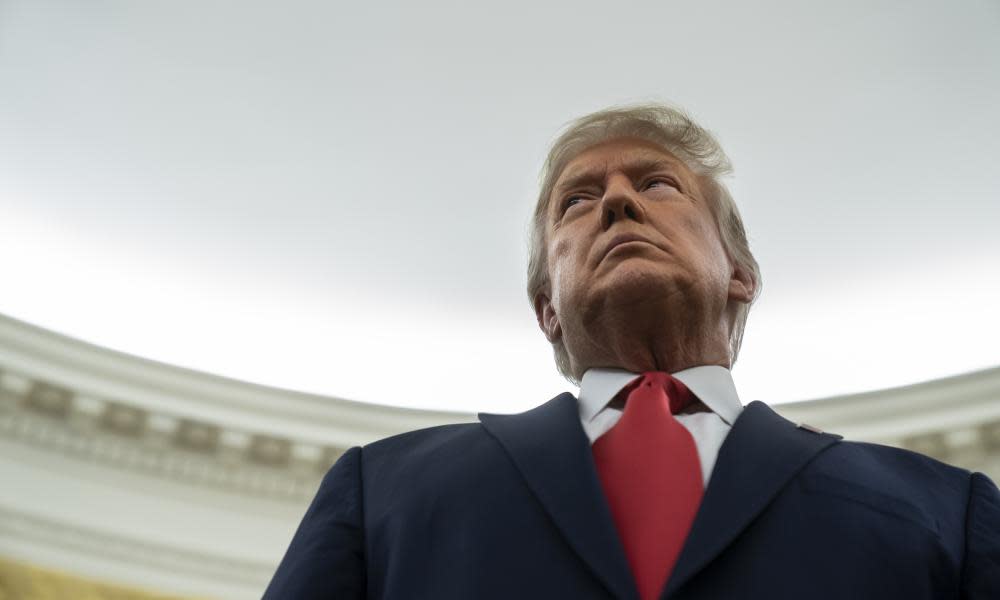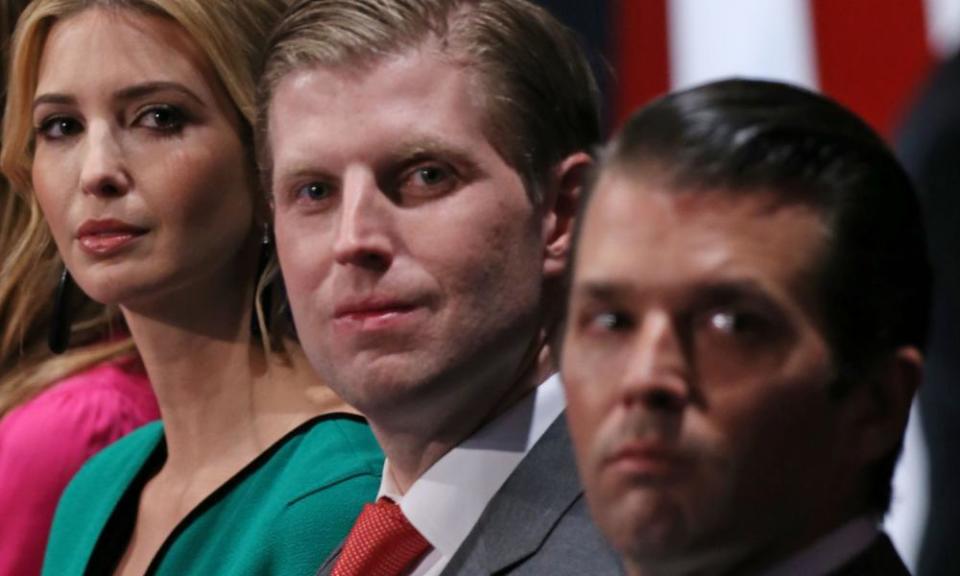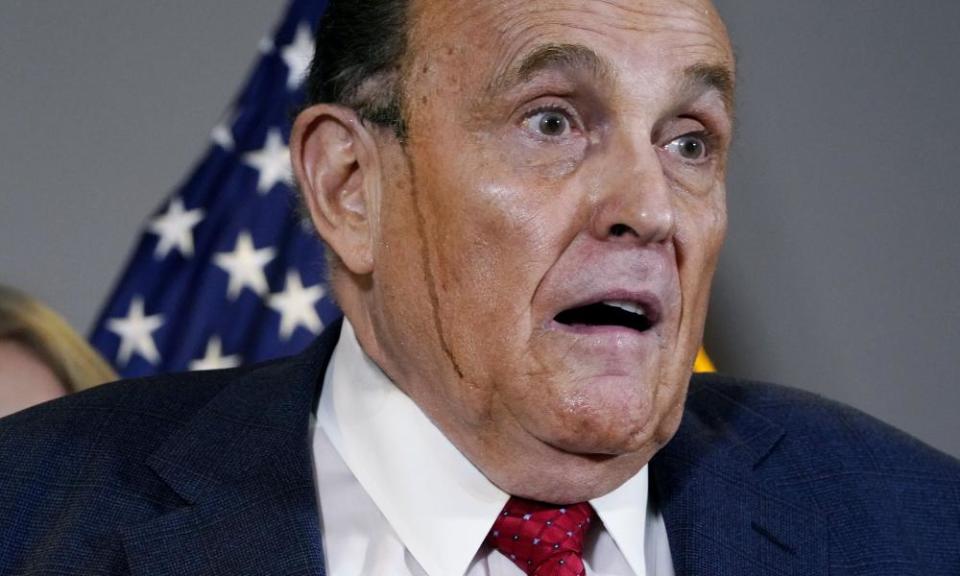I beg your pardon? Does Trump really plan to absolve himself and his family?

Rudy Giuliani. Ivanka Trump. Joseph Maldonado-Passage, AKA Joe Exotic, star of the Netflix series Tiger King. And, just possibly, Donald Trump himself.
These are some of the candidates mentioned as prospects for official pardons before the US president leaves office on 20 January. Such a spree would test the political and constitutional limits of a centuries-old power that echoed the British monarchy. It would also be revelatory of the potential legal jeopardy of Trump and his allies once they depart the White House.
Related: Decline and fall: what Donald Trump can learn from the Roman emperors
“The fact that we’re even having this conversation speaks volumes about the level of criminal exposure that they all think that they have,” said Tara Setmayer, a former Republican communications director on Capitol Hill. “You don’t talk about pardons unless there is a concern about things that have been done wrong. It’s the antithesis of draining the swamp. What happened to that?”
While presidents signing divisive pardons in the twilight of their administrations has become something of a Washington ritual, Trump is said to be considering an unusually high number of interventions in the cases of aides, friends and family members he believes have been unfairly imprisoned, indicted or put at legal risk.
Last month’s pardoning of Michael Flynn, his former national security adviser who lied to the FBI about his conversations with a Russian diplomat, could be just the beginning. In the past week it emerged that the justice department is investigating an alleged “bribery for pardon” scheme at the White House.
It was also reported that Trump’s lawyer Rudy Giuliani, whose business dealings in Ukraine are under investigation by federal prosecutors in Manhattan, had spoken to the president about a pardon. Giuliani denied the account.
Among others hoping for Trump’s tender mercies are old allies convicted in the wake of the special counsel Robert Mueller’s Russia investigation, which he continues to denounce as a hoax, including the former campaign chairman Paul Manafort, his deputy, Rick Gates, and ex-campaign aide George Papadopoulos.

Gates, found guilty of financial crimes and lying to the FBI, said this week: “I think the president knows better than anybody the difficult and just tragic event of the Mueller probe and how all of us have suffered. I would be absolutely grateful for a pardon and I hope the president does it but, at the end of the day, it’s his choice. People ask me, ‘Would you take a pardon?’ Of course, absolutely. Who wouldn’t?”
One such example is Maldonado-Passage, better known as Joe Exotic and currently serving 22 years in prison for his role in a murder-for-hire plot against a longtime rival. In September he filed an application for a pardon with the justice department that included a handwritten letter to Trump asking him to “grant me a miracle”.
But pardons can also come very close to home. The New York Times reported that Trump has asked advisers about the possibility of “pre-emptively” pardoning his three eldest children. Defenders of such a move could argue that family members are not off limits: in 2001, Bill Clinton pardoned his brother, Roger, who was convicted for cocaine possession in Arkansas.
Trump’s offspring have not been accused of any criminal wrongdoing but, in a sign of potential legal perils to come, his daughter and senior adviser, Ivanka, was this week interviewed by lawyers in Washington alleging that Trump’s 2017 inauguration committee misused donor funds.
In addition, Cyrus Vance, the Manhattan district attorney, and Letitia James, New York’s attorney general, have active tax fraud investigations into Trump and his family company, the Trump Organization. His son Eric, an executive vice-president of the company, was deposed in October because of his involvement.
Presidents can grant clemency to people who have not yet been charged, as President Gerald Ford did in 1974 when he issued a broad pardon to his predecessor, Richard Nixon. But the pardons apply only to federal crimes and do not extend to state laws, so Trump’s ability to insulate his family and himself is limited.
Even so, a self-pardon might at least shield him from potentially the most serious federal case against him: Mueller’s final report identified 10 instances of possible obstruction of justice, and hundreds of former prosecutors concluded that the evidence supported such a charge.
But a self-pardon would open a legal can of worms. In 2018, Trump declared that he had the “absolute right” to pardon himself but none of his predecessors – not even Nixon – ever put that to the test. Gates suggested that it would be justified “in the context of what he’s been through and being the only president in US history, Republican or Democrat, that’s been attacked over a sustained period, almost four years. There’s never been anything like it in the history of our politics.”
He added: “So on that basis, if I were him, I would absolutely seriously consider it just for the mere fact that you wouldn’t want your enemies to come after you. I honestly don’t think Joe Biden will, but that doesn’t mean people under Joe Biden won’t and I think that’s the real threat in the federal level.”
Many legal experts, however, contend that a self-pardon would be unconstitutional because it violates the basic principle that nobody should be the judge in his or her own case.
Laurence Tribe, a constitutional law professor at Harvard University, argued in an email that it “flies in the face of the universally agreed proposition that the pardon power cannot be used as a license to commit future crimes”.

He added: “The basic problem is that, if a president were able to pardon himself, he could commit crimes with impunity throughout his presidency. He could ransack the treasury, bribe the chief justice to overrule Roe v Wade, and shoot someone on Fifth Avenue knowing he could never be punished.”
The nation’s founders saw the pardon power as a way to show the quality of mercy. While Trump might undermine their credibility in the short term, experts say he is not the first president to be accused of abusing pardons and is unlikely to do lasting constitutional damage.
David Super, a law and economics professor at Georgetown University, said: “The very discussion of it has undermined public confidence in them but it’s not an area where Congress can legislate. The only way that it could change would be through a constitutional amendment.”
He added: “There have been people pardoned that many thought should not have been. President Clinton had some pardons that many people thought were at least ill-advised, if not corrupt, and President Ford’s pardon of President Nixon probably cost him any chance of being elected in his own right.
“So there certainly have been criticisms of them but it’s so hard to amend the constitution that people haven’t felt energised enough to do that heavy lifting. But on the state level, where one governor or another abused the power and it’s not quite such a heavy lift to change the constitution, that has happened in many places.”


